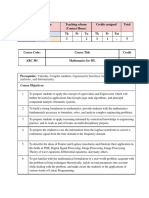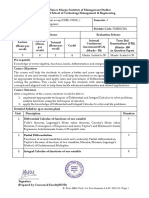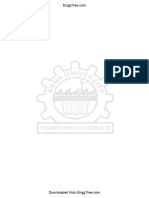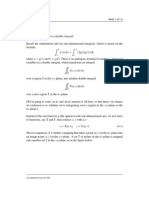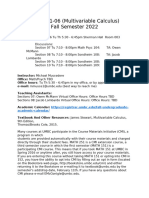BMAT101L-Calculus Theory, Syllabus
BMAT101L-Calculus Theory, Syllabus
Uploaded by
Harish GANANATHAN SBCopyright:
Available Formats
BMAT101L-Calculus Theory, Syllabus
BMAT101L-Calculus Theory, Syllabus
Uploaded by
Harish GANANATHAN SBCopyright
Available Formats
Share this document
Did you find this document useful?
Is this content inappropriate?
Copyright:
Available Formats
BMAT101L-Calculus Theory, Syllabus
BMAT101L-Calculus Theory, Syllabus
Uploaded by
Harish GANANATHAN SBCopyright:
Available Formats
Course code Course title L T P J C
BMAT101L Calculus 3 0 0 0 3
Pre-requisite Syllabus version
v. 1.0
Course Objectives
1. To provide the requisite and relevant background necessary to understand the other important
engineering mathematics courses offered for Engineers and Scientists.
2. To introduce important topics of applied mathematics, namely Single and Multivariable
Calculus and Vector Calculus etc.
3. Enhance to use technology to model the physical situations into mathematical problems,
experiment, interpret results, and verify conclusions.
Course Outcomes
At the end of the course the student should be able to:
1. Apply single variable differentiation and integration to solve applied problems in engineering
and find the maxima and minima of functions
2. Evaluate partial derivatives, limits, total differentials, Jacobians, Taylor series and optimization
problems involving several variables with or without constraints
3. Evaluate multiple integrals in Cartesian, Polar, Cylindrical and Spherical coordinates.
4. Use special functions to evaluate various types of integrals.
5. Understand gradient, directional derivatives, divergence, curl, Green’s, Stokes and Gauss
Divergence theorems.
Module:1 Single Variable Calculus 8 hours
Differentiation- Extrema on an Interval Rolle’s Theorem and the Mean value theorem-Increasing
and decreasing functions.-First derivative test-Second derivative test-Maxima and Minima-
Concavity. Integration-Average function value - Area between curves - Volumes of solids of
revolution.
Module:2 Multivariable Calculus 5 hours
Functions of two variables-limits and continuity-partial derivatives –total differential-Jacobian
and its properties.
Module:3 Application of Multivariable Calculus 5 hours
Taylor’s expansion for two variables–maxima and minima–constrained maxima and minima-
Lagrange’s multiplier method.
Module:4 Multiple integrals 8 hours
Evaluation of double integrals–change of order of integration–change of variables between
Cartesian and polar co-ordinates - evaluation of triple integrals-change of variables between
Cartesian and cylindrical and spherical co-ordinates.
Module:5 Special Functions 6 hours
Beta and Gamma functions–interrelation between beta and gamma functions-evaluation of
multiple integrals using gamma and beta functions. Dirichlet’s integral -Error functions
complementary error functions.
Module:6 Vector Differentiation 5 hours
Scalar and vector valued functions – gradient, tangent plane–directional derivative-divergence and
curl–scalar and vector potentials. Statement of vector identities-simple problems.
Module:7 Vector Integration 6 hours
Line, surface and volume integrals - Statement of Green’s, Stoke’s and Gauss divergence
theorems -verification and evaluation of vector integrals using them.
Module:8 Contemporary Topics 2 hours
Guest lectures from Industry and, Research and Development Organizations
Total Lecture hours: 45 hours
Text Book
1. George B.Thomas, D.Weir and J. Hass, Thomas Calculus, 2014, 13th edition, Pearson
Reference Books
1. Erwin Kreyszig, Advanced Engineering Mathematics, 2015, 10th Edition, Wiley India
2. B.S. Grewal, Higher Engineering Mathematics, 2020, 44th Edition, Khanna Publishers
3. John Bird, Higher Engineering Mathematics, 2017, 6th Edition, Elsevier Limited.
4. James Stewart, Calculus: Early Transcendental, 2017, 8th edition, Cengage Learning.
5. K.A.Stroud and Dexter J. Booth, Engineering Mathematics, 2013, 7th Edition, Palgrave
Macmillan.
Mode of Evaluation: CAT, Assignment, Quiz and FAT
Recommended by Board of Studies 24-06-2021
Approved by Academic Council No. 62 Date 15-07-2021
You might also like
- Differential and Integral Calculus: Sixth EditionDocument608 pagesDifferential and Integral Calculus: Sixth Editioneyihjih100% (4)
- Schaum's Outline of Introduction to Mathematical Economics, 3rd EditionFrom EverandSchaum's Outline of Introduction to Mathematical Economics, 3rd EditionRating: 4 out of 5 stars4/5 (5)
- 24644.AM121 - 2020 ChalkpadDocument3 pages24644.AM121 - 2020 ChalkpadChhavi GargNo ratings yet
- Ravish R Singh Maths 1Document1,051 pagesRavish R Singh Maths 1krish modi91% (11)
- BMAT101L CalculusDocument4 pagesBMAT101L CalculusJMR NoneNo ratings yet
- Bmat101l Calculus TH 1.0 65 Bmat101lDocument3 pagesBmat101l Calculus TH 1.0 65 Bmat101lMinaNo ratings yet
- Mat1011 Calculus-For-Engineers Eth 1.0 37 Mat1011Document3 pagesMat1011 Calculus-For-Engineers Eth 1.0 37 Mat1011Sahil KalingNo ratings yet
- MAT1011Document3 pagesMAT1011Manav ModiNo ratings yet
- Mat 1001Document3 pagesMat 1001Taran MamidalaNo ratings yet
- Ilovepdf MergedDocument24 pagesIlovepdf MergedAyush Ranjan OjhaNo ratings yet
- Mathematics - Syllabus - B.Tech - First Year - 2022-23Document8 pagesMathematics - Syllabus - B.Tech - First Year - 2022-23iamvishu000No ratings yet
- Mathematics Courses in B Tech - Department of MathematicsDocument19 pagesMathematics Courses in B Tech - Department of Mathematicsrajjoshi94380No ratings yet
- Department of Physics Bsc. (Hons.) Physics: Discipline Specific Core Course - 1 (Dsc-1) Mathematical Physics IDocument96 pagesDepartment of Physics Bsc. (Hons.) Physics: Discipline Specific Core Course - 1 (Dsc-1) Mathematical Physics IHimanshu JoshiNo ratings yet
- Sem I Syllabus BSC (Hons. Physics)Document13 pagesSem I Syllabus BSC (Hons. Physics)Rizwan ChoudharyNo ratings yet
- Course Code: MA102 Title: Engineering Mathematics - IDocument4 pagesCourse Code: MA102 Title: Engineering Mathematics - Ishivang ranjanNo ratings yet
- B.tech r20 Cse Ai ML SyllabusDocument166 pagesB.tech r20 Cse Ai ML SyllabusBarani AbhishekNo ratings yet
- 01ma1101 Differential and Integral CalculusDocument3 pages01ma1101 Differential and Integral CalculusTYTEC TUBE100% (1)
- Mat3003 Complex-Variables-And-partial-differential-equations TH 1.1 47 Mat3003Document2 pagesMat3003 Complex-Variables-And-partial-differential-equations TH 1.1 47 Mat3003MagnetoSamparkaNo ratings yet
- Math CourseDocument3 pagesMath CourseTarunikkNo ratings yet
- Bmat201l Complex-Variables-And-Linear-Algebra TH 1.0 65 Bmat201lDocument3 pagesBmat201l Complex-Variables-And-Linear-Algebra TH 1.0 65 Bmat201lKrijayNo ratings yet
- ETC-EC-EN 2 YR CurriculumDocument50 pagesETC-EC-EN 2 YR CurriculumAmit TripathiNo ratings yet
- Engineering Mathematics-I SyllabusDocument2 pagesEngineering Mathematics-I Syllabusdevrsahani23No ratings yet
- Syllabus PDFDocument63 pagesSyllabus PDFArbind KumarNo ratings yet
- Syllabus 1st YearDocument23 pagesSyllabus 1st YearS.m. ChandrashekarNo ratings yet
- MAT1001 Calculus For Engineers - Syllabus-1Document4 pagesMAT1001 Calculus For Engineers - Syllabus-1soyamsidh dasNo ratings yet
- Mat1031 Introduction-To-calculus Lt 1.0 1 Mat1031Document2 pagesMat1031 Introduction-To-calculus Lt 1.0 1 Mat1031guptadhruv472No ratings yet
- 3-sem_Mech_15EMAB201(24-25)Document39 pages3-sem_Mech_15EMAB201(24-25)chipativijayNo ratings yet
- Problems Using ScilabDocument28 pagesProblems Using Scilabdeepika snehiNo ratings yet
- M-1 C OTL-fall2011-2012Document4 pagesM-1 C OTL-fall2011-2012Khaled Md Tuhidul HossainNo ratings yet
- 19MAT111 - Multi Variable Calculus Syllabus For StudentsDocument2 pages19MAT111 - Multi Variable Calculus Syllabus For StudentsSuhas BNo ratings yet
- Mathematics For - ML (AURO)Document5 pagesMathematics For - ML (AURO)immortalwealth2k4No ratings yet
- 01 - Calculus and Laplace TransformsDocument3 pages01 - Calculus and Laplace TransformsameyamathurNo ratings yet
- Sem-3 Complete Syllabus-1Document20 pagesSem-3 Complete Syllabus-1meenamonika048No ratings yet
- bsc syllabusDocument11 pagesbsc syllabusvibhanshukumar01No ratings yet
- MA8151 Engineering Mathematics SyllabusDocument2 pagesMA8151 Engineering Mathematics SyllabusPAMANI1981No ratings yet
- 4-Sem EC 15EMAB208 (2023-24)Document28 pages4-Sem EC 15EMAB208 (2023-24)01fe21bec262No ratings yet
- MAT1001 SyllabusDocument4 pagesMAT1001 SyllabusVenkat KancherlaNo ratings yet
- Au Syllabus 2022 - 2023Document7 pagesAu Syllabus 2022 - 2023AmrineNo ratings yet
- Applied MathematicsIIDocument3 pagesApplied MathematicsIIKeshav KumarNo ratings yet
- Mat1001 Calculus-And-Laplace-Transforms LT 1.0 1 Mat1001Document3 pagesMat1001 Calculus-And-Laplace-Transforms LT 1.0 1 Mat1001Ankit JindalNo ratings yet
- Mathematics SyllabusDocument13 pagesMathematics SyllabusSARTHAK SHARMANo ratings yet
- Mathematics R 18Document31 pagesMathematics R 18VigneshNo ratings yet
- Syllabus - MATH 1215Document2 pagesSyllabus - MATH 1215Rakibul islam RakibNo ratings yet
- 22MATS21Document5 pages22MATS21ajayicon115No ratings yet
- Course Plan: Department of MathematicsDocument21 pagesCourse Plan: Department of Mathematicsazas asdNo ratings yet
- SyllabusDocument78 pagesSyllabusRanjith PKNo ratings yet
- BTech MBATechFirstYearSyllabus202122Document55 pagesBTech MBATechFirstYearSyllabus202122Shruti NaikNo ratings yet
- MAE11 Advanced CalculusDocument3 pagesMAE11 Advanced CalculusJai VishnuNo ratings yet
- SCI Lab Manual Format-Final - 1Document66 pagesSCI Lab Manual Format-Final - 1PRANAV VIKRAMAN S S ECE DEPTNo ratings yet
- Cssyll 3Document21 pagesCssyll 3Mohan H G SantyNo ratings yet
- Semester Ii: Discipline: CIVIL ENGINEERING Stream: CE2Document70 pagesSemester Ii: Discipline: CIVIL ENGINEERING Stream: CE2mohdsabithtNo ratings yet
- Engineering Mathematics IiDocument4 pagesEngineering Mathematics IisocialmediauserfromearthNo ratings yet
- Math_Python_Lab ManualDocument96 pagesMath_Python_Lab Manualdeekshasn18No ratings yet
- 63 - Mathematics 2nd YearDocument14 pages63 - Mathematics 2nd YearSHUVASHISH BHOWMICK 44 Batch FENo ratings yet
- 22MATE11Document5 pages22MATE11Gayatri JoshiNo ratings yet
- 22MATE21Document5 pages22MATE21vikram kharviNo ratings yet
- Maths 11Document2 pagesMaths 11rit dharNo ratings yet
- Course Outline - Math355Document5 pagesCourse Outline - Math355Nu NanaNo ratings yet
- ENGINEERING MATHEMATICS I Syla PDFDocument4 pagesENGINEERING MATHEMATICS I Syla PDFpavaniiNo ratings yet
- Smta 1101Document1 pageSmta 1101VISVAA.JNo ratings yet
- UG Mathematics Syllabus NEP Semester I IIDocument8 pagesUG Mathematics Syllabus NEP Semester I IIhariomkashyap73609No ratings yet
- Complex Variables for Scientists and Engineers: Second EditionFrom EverandComplex Variables for Scientists and Engineers: Second EditionRating: 5 out of 5 stars5/5 (1)
- Basic Electronics ECE101P: by Dr. M. Jasmin Professor, SENSEDocument13 pagesBasic Electronics ECE101P: by Dr. M. Jasmin Professor, SENSEHarish GANANATHAN SBNo ratings yet
- Basic Electronics ECE101L: by Dr. M. Jasmin B.E (ECE), M.E, PH.D Professor, SENSEDocument50 pagesBasic Electronics ECE101L: by Dr. M. Jasmin B.E (ECE), M.E, PH.D Professor, SENSEHarish GANANATHAN SBNo ratings yet
- Course Code Basic Electronics Lab L T P J C BECE101P 0 0 2 0 1 Pre-Requisite Nil Syllabus Version Course ObjectivesDocument1 pageCourse Code Basic Electronics Lab L T P J C BECE101P 0 0 2 0 1 Pre-Requisite Nil Syllabus Version Course ObjectivesHarish GANANATHAN SBNo ratings yet
- Course Code Basic Electronics Lab L T P J C BECE101P 0 0 2 0 1 Pre-Requisite Nil Syllabus Version Course ObjectivesDocument1 pageCourse Code Basic Electronics Lab L T P J C BECE101P 0 0 2 0 1 Pre-Requisite Nil Syllabus Version Course ObjectivesHarish GANANATHAN SBNo ratings yet
- P-N Junction Diode CharacteristicsnewDocument5 pagesP-N Junction Diode CharacteristicsnewHarish GANANATHAN SBNo ratings yet
- Basic Math SymbolsDocument15 pagesBasic Math SymbolsYM Tuan Isya100% (1)
- B.Tech CH PDFDocument146 pagesB.Tech CH PDFAshutosh MishraNo ratings yet
- Department of Mathematics and Statistics, Indian Institute of Technology Kanpur MTH 101A, 2017-2018, I SemesterDocument3 pagesDepartment of Mathematics and Statistics, Indian Institute of Technology Kanpur MTH 101A, 2017-2018, I SemesterVivek RunwalNo ratings yet
- Surface and Volume Integrals: Study GuideDocument35 pagesSurface and Volume Integrals: Study GuideAkshay SharmaNo ratings yet
- Real AnalysisDocument30 pagesReal AnalysisAyush RanjanNo ratings yet
- Double Integral Over Rectangular RegionsDocument12 pagesDouble Integral Over Rectangular Regionsvishank94No ratings yet
- EnggTree Syllabus Aids 2021Document76 pagesEnggTree Syllabus Aids 2021vishnuai4568No ratings yet
- 8. JNTUA B.tech . AI DS R23 I II Year Course Structure and SyllabusDocument102 pages8. JNTUA B.tech . AI DS R23 I II Year Course Structure and SyllabuskatariharshavardhanNo ratings yet
- L /L /L /L: 3. 3A. Double Integrals in Rectangular CoordinatesDocument4 pagesL /L /L /L: 3. 3A. Double Integrals in Rectangular CoordinatesShaip DautiNo ratings yet
- B.tech Information Technology SyllabusDocument52 pagesB.tech Information Technology Syllabussatishray15No ratings yet
- CurriculumDocument31 pagesCurriculumMahita AjmeraNo ratings yet
- Mech Syllabus Book 14-02-2023Document340 pagesMech Syllabus Book 14-02-2023THALA FREE FIRENo ratings yet
- Triple IntegralsDocument84 pagesTriple IntegralsSharad ShrivastavaNo ratings yet
- Applied Mathematics II Course OutlineDocument3 pagesApplied Mathematics II Course OutlineDejene LemmaNo ratings yet
- Multiple IntegralsDocument133 pagesMultiple Integralsmanasa raajheshNo ratings yet
- MATHS 2007: Curtin University of Technology Department of Mathematics and StatisticsDocument6 pagesMATHS 2007: Curtin University of Technology Department of Mathematics and StatisticsMeyoNo ratings yet
- B.E. Mech PDFDocument113 pagesB.E. Mech PDFarulmuruguNo ratings yet
- MA1511 2021S1 Chapter 2 Multiple IntegralsDocument18 pagesMA1511 2021S1 Chapter 2 Multiple IntegralsJustin NgNo ratings yet
- pdf24 UnidoDocument2,386 pagespdf24 UnidoJuan armNo ratings yet
- Engr CalculusDocument2 pagesEngr CalculusSuresh RNo ratings yet
- Cse SyllabusDocument158 pagesCse SyllabusADITYA REDDY MEKALANo ratings yet
- B.E. Aero PDFDocument102 pagesB.E. Aero PDFvanithapremkumarNo ratings yet
- ME Microwave PDFDocument60 pagesME Microwave PDFjoinmeifyoucanNo ratings yet
- Calculus C: Course Info ScheduleDocument3 pagesCalculus C: Course Info ScheduleAraltNo ratings yet
- Change of Variables in A Double IntegralDocument12 pagesChange of Variables in A Double IntegralTom JonesNo ratings yet
- Math251_06Fall22-syllabusDocument8 pagesMath251_06Fall22-syllabusnonsensehypatiaNo ratings yet
- Fe Tutorials Sem2Document8 pagesFe Tutorials Sem2narendasreNo ratings yet
- Chat GPT3Document1 pageChat GPT3KrishnaNo ratings yet






























